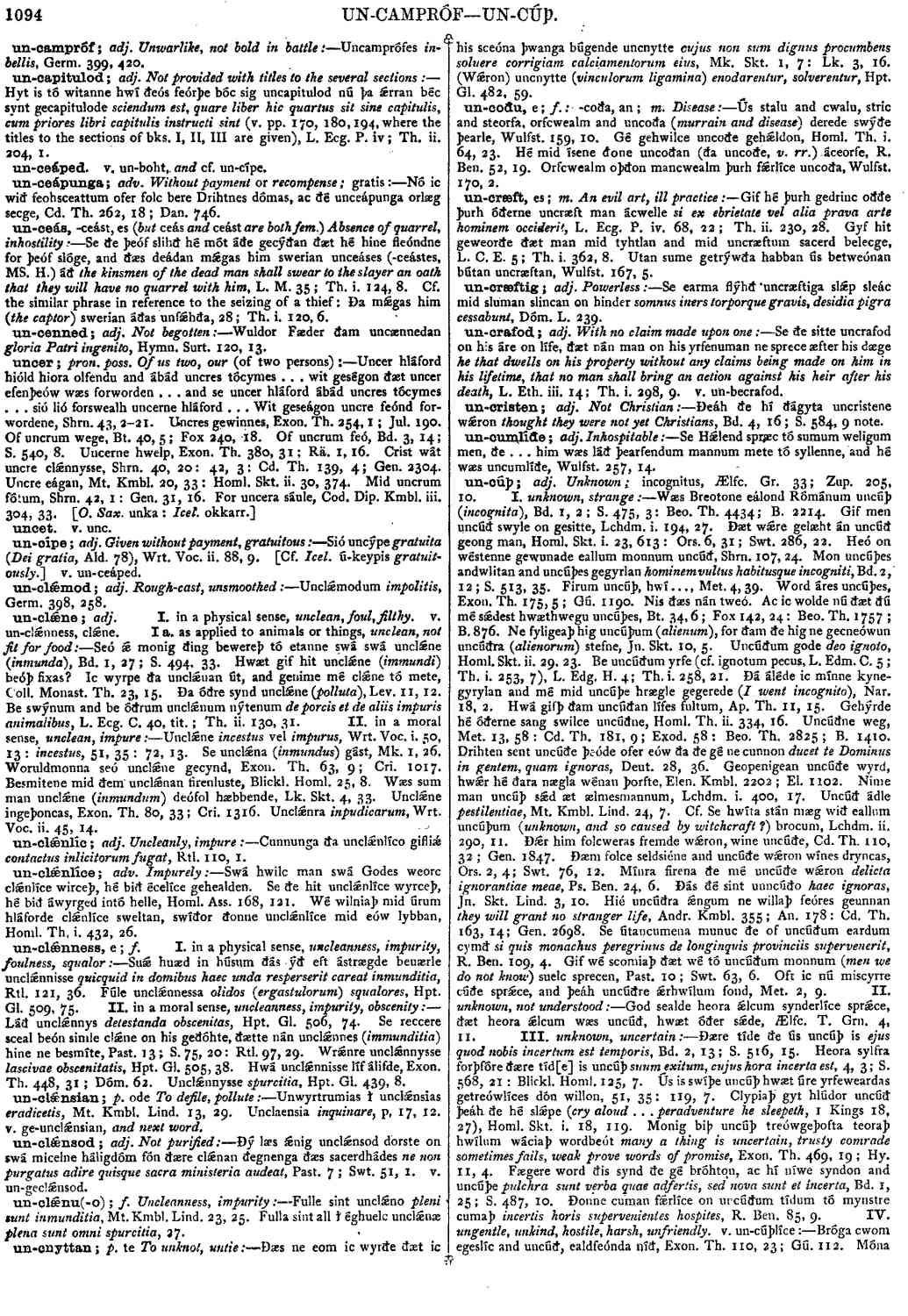un-cúþ
- adjective
- Ælfc. Gr. 33 ;
- Zup. 205, 10.
-
Wæs Breotone eálond Rómánum uncúþ (
incognita
),- Bd. 1, 2 ;
- S. 475, 3: Beo. Th. 4434 ;
- B. 2214.
-
Gif men uncúð swyle on gesitte,
- Lchdm. i. 194, 27.
-
Ðæt wǽre gelæht án uncúð geong man,
- Homl. Skt. i. 23, 613: Ors. 6, 31 ;
- Swt. 286, 22.
-
Heó on wéstenne gewunade eallum monnum uncúð,
- Shrn. 107, 24.
-
Mon uncúþes andwlitan and uncúþes gegyrlan
hominem vultus habitusque incogniti,
- Bd. 2, 12 ;
- S. 513, 35.
-
Firum uncúþ, hwí...,
- Met. 4, 39.
-
Word áres uncúþes,
- Exon. Th. 175, 5 ;
- Gú. 1190.
-
Nis ðæs nán tweó. Ac ic wolde nú ðæt ðú mé sǽdest hwæthwegu uncúþes,
- Bt. 34, 6 ;
- Fox 142, 24: Beo. Th. 1757 ;
- B. 876.
-
Ne fyligeaþ hig uncúþum ( alienum ), for ðam ðe hig ne gecneówun uncúðra (alienorum ) stefne,
- Jn. Skt. 10, 5.
-
Uncúðum gode
deo ignoto,
- Hontl. Skt. ii. 29. 23.
-
Be uncúðum yrfe (cf. ignotum pecus, L. Edm. C. 5; Th. i. 253, 7),
- L. Edg. H. 4 ;
- Th. i. 258, 21.
-
Ðá áléde ic mínne kynegyrylan and mé mid uncúþe hrægle gegerede (
I went incognito
),- Nar. 18, 2.
-
Hwá gifþ ðam uncúðan lífes fultum,
- Ap. Th. 11, 15.
-
Gehýrde hé óðerne sang swilce uncúðne,
- Homl. Th. ii. 334, 16.
-
Uncúðne weg,
- Met. 13, 58: Cd. Th. 181, 9 ;
- Exod. 58: Beo. Th. 2825 ;
- B. 1410.
-
Drihten sent uncúðe þeóde ofer eów ða ðe gé ne cunnon
ducet te Dominus in gentem, quam ignoras,
- Deut. 28, 36.
-
Geopenigean uncúðe wyrd, hwǽr hé ðara nægla wénan þorfte,
- Elen. Kmbl. 2202 ;
- El. 1102.
-
Nime man uncúþ sǽd at ælmesmannum,
- Lchdm. i. 400, 17.
-
Uncúð ádle
pestilentiae,
- Mt. Kmbl. Lind. 24, 7.
-
Cf. Se hwíta stán mæg wið eallum uncúþum ( unknown, and so caused by witchcraft? ) brocum,
- Lchdm. ii. 290, 11.
-
Ðǽr him folcweras fremde wǽron, wine uncúðe,
- Cd. Th. 110, 32 ;
- Gen. 1847.
-
Ðæm folce seldsiéne and uncúðe wǽron wínes dryncas,
- Ors. 2, 4 ;
- Swt. 76, 12.
-
Mínra firena ðe mé uncúðe wǽron
delicta ignorantiae meae,
- Ps. Ben. 24, 6.
-
Ðás ðé sint unncúðo
haec ignoras,
- Jn. Skt. Lind. 3, l0.
-
Hié uncúðra ǽngum ne willaþ feóres geunnan
they will grant no stranger life,
- Andr. Kmbl. 355 ;
- An. 178: Cd. Th. 163, 14 ;
- Gen. 2698.
-
Se útancumena munuc ðe of uncúðum eardum cymð
si quis monachus peregrinus de longinquis provinciis supervenerit,
- R. Ben. 109, 4.
-
Gif wé scomiaþ ðæt wé tó uncúðum monnum ( men we do not know ) suelc sprecen,
- Past. 10 ;
- Swt. 63, 6.
-
Oft ic nú miscyrre cúðe sprǽce, and þeáh uncúðre ǽrhwílum fond,
- Met. 2, 9.
-
God sealde heora ǽlcum synderlíce sprǽce, ðæt heora ǽlcum wæs uncúð, hwæt óðer sǽde,
- Ælfc. T. Grn. 4, 11.
-
Ðære tíde ðe ús uncúþ is
ejus quod nobis incertum est temporis,
- Bd. 2, 13 ;
- S. 516, 15.
-
Heora sylfra forþfóre ðære tíd[e] is uncúþ
suum exitum, cujus hora incerta est,
- 4, 3 ;
- S. 568, 21: Blickl. Homl. 125, 7.
-
Ús is swíþe uncúþ hwæt úre yrfeweardas getreówlíces dón willon,
- 51, 35: 119, 7.
-
Clypiaþ gyt hlúdor uncúð þeáh ðe hé slǽpe (
cry aloud ... peradventure he sleepeth, 1 Kings 18, 27),
- Homl. Skt. i. 18, 119.
-
Monig biþ uncúþ treówgeþofta teoraþ hwílum wáciaþ wordbeót
many a thing is uncertain, trusty comrade sometimes fails, weak prove words of promise,
- Exon. Th. 469, 19 ;
- Hy. 11, 4.
-
Fægere word ðis synd ðe gé bróhton, ac hí níwe syndon and uncúþe
pulchra sunt verba quae adfertis, sed nova sunt et incerta,
- Bd. 1, 25 ;
- S. 487, 10.
-
Ðonne cuman fǽrlíce on uncúðum tídum tó mynstre cumaþ
incertis horis supervenientes hospites,
- R. Ben. 85, 9.
-
Bróga cwom egeslíc and uncúð, ealdfeónda níð,
- Exon. Th. 110, 23 ;
- Gú. 112.
-
Móna se ehtoða ... cild ácenned uncúð (
unfriendly?
),strang,
- Lchdm. iii. 188, 3.
-
Wé genéðdon eafoð uncúþes ( Grendel ); úþe ic swíþor, ðæt ðú hine selfne geseón móste, feónd fylwérigne,
- Beo. Th. 1924 ;
- B. 960.
-
Sceaþa eáweþ uncúðne níð,
- 558 ;
- B. 276.
-
Mec ongon hreówan ðæt mín hondgeweorc on feónda geweald féran sceolde, sceolde uncúðne eard cunnian, sáre síþas,
- Exon. Th. 86, 34 ;
- Cri. 1418.
Bosworth, Joseph. “un-cúþ.” In An Anglo-Saxon Dictionary Online, edited by Thomas Northcote Toller, Christ Sean, and Ondřej Tichy. Prague: Faculty of Arts, Charles University, 2014. https://bosworthtoller.com/32727.
Checked: 1